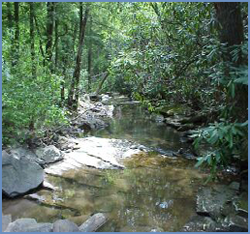
Municipal Storm Water
Rain water falling on industries, urban areas and construction activities can become contaminated with many different types of pollutants. These untreated waters can carry pollutants into surface waters. TDEC Water Pollution Control implements the EPA Phase I and Phase II regulations to address storm water runoff in Tennessee.
>>> Learn more about the Municipal Storm Water program
Tennessee's TMDL Program
Clean Water Act Section 303(d) establishes the Total Maximum Daily Load (TMDL) program. The purpose of the TMDL program is to identify remaining sources of pollution and allocate pollution control needs in places where water quality goals are still not being achieved.
>>> Learn more about the Total Maximum Daily Load program
Watershed Management
The Division of Water Pollution Control has the responsibility to secure, protect, and preserve the right of Tennessee's citizens to unpolluted waters. In the past, this has meant that the Division focused on controlling the quality of wastewater that was discharged by municipalities and industries. The Watershed Approach is based on the concept that Tennessee's waters are best assessed and water quality problems best addressed at the watershed level.
>>> Learn more about the Watershed Management program
Tennessee Erosion Prevention and Sediment Control Training and Certification Program
One of the main program responsibilities of the Tennessee Water Resources Research Center is the transfer of information through professional training and education. A major part of this program is the training of individuals involved in land disturbing activities. Sediment is a major contributor to the pollution of streams in Tennessee and construction activities are a major source of sediment and stream siltation.
Mining Program
Administers the Water Quality Control Act for mining operations; and the Tennessee Mineral Surface Mining Act of 1972 for minerals covered under that law.
>>> Learn more about Surface Mining Permitting
Abandoned Mine Land Reclamation
Abandoned coal mines pose serious threats to public health, safety and welfare as well as degrade the environment.
>>> Learn more about the Abandoned Mine Land Reclamation program
Best Management Practices for Treating Abandoned Mine Land Runoff
The Tennessee Department of Agriculture maintains information to best manage runoff from Abandoned Mine Land
>>> Learn
more about Best Management Practices for Treating Abandoned Mine Land
Runoff ![]()



